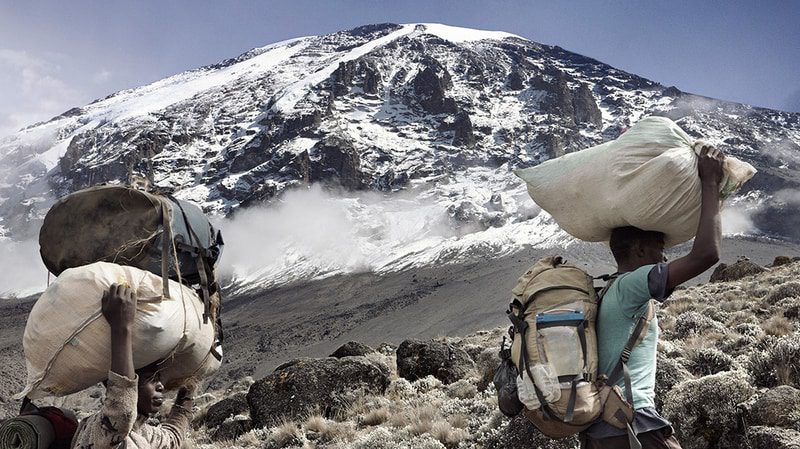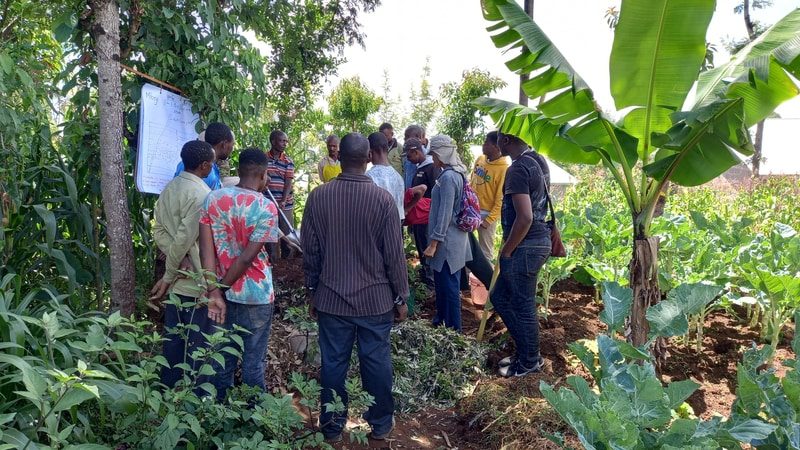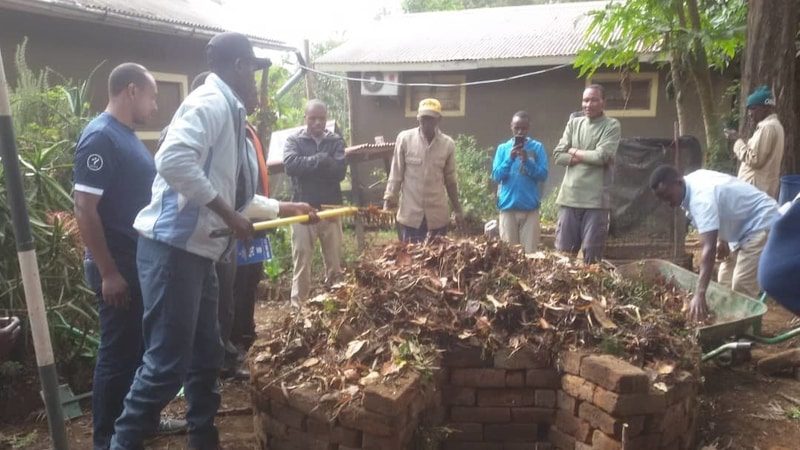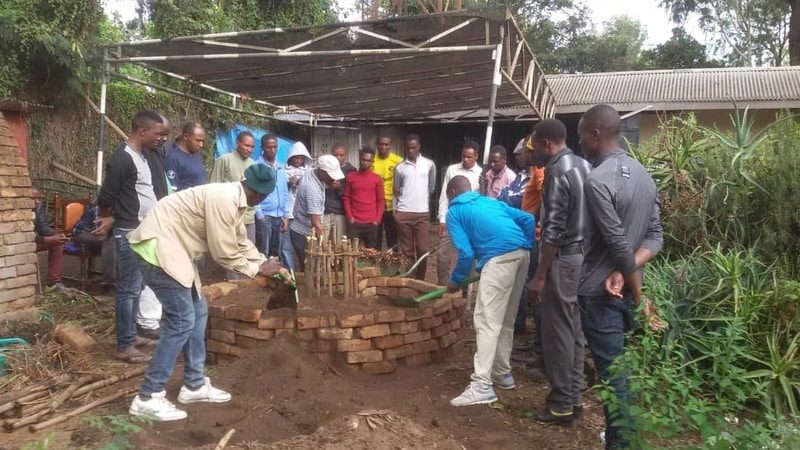The Kilimanjaro Porters Help Venture (KPAP) has been bettering porters’ lives and combating for higher circumstances on Kili since 2003. When the pandemic hit and borders closed in 2020, 1000’s of porters confronted unemployment. KPAP turned to an uncommon answer: natural gardening.
Karen Valenti remembers what life was like for porters on Tanzania’s Mt. Kilimanjaro. Rewind 20 years, earlier than the Kilimanjaro Porters Help Venture (KPAP) started, and circumstances on the mountain have been grim, to say the least.
“After I got here on board in 2004, porters have been carrying heavy masses – greater than the trade’s weight limitation,” she says. “They have been solely getting one meal a day, sleeping in crowded, poor situation tents, and receiving very low salaries.”


Karen is the Program Coordinator of KPAP, an area non-government organisation, and Intrepid Basis accomplice, that has been working to enhance the lives of Kilimanjaro’s porters for 20 years. KPAP is predicated within the small city of Moshi, often known as the gateway to Kili. Throughout trekking seasons earlier than the pandemic, 40,000 to 50,000 travellers would swarm into Tanzania, backpacks stuffed to the gills, able to sort out Africa’s highest peak: the snow-capped volcano of Kilimanjaro, looming 19,341 toes above the savannah.
When these travellers arrive, they’re greeted by an invisible military of porters. Nobody’s ever taken an correct census, however Karen estimates there are round 20,000 porters working the mountain every season, servicing between 300 and 400 trekking corporations. Forty-eight of those corporations, together with Intrepid, are companions with KPAP, which suggests their treks meet sure requirements for porter welfare, wages and dealing circumstances. The remaining are usually not. By their accomplice corporations, KPAP takes care of roughly 7,150 porters in Tanzania; a couple of third of the whole quantity engaged on Kilimanjaro.
“All climbing corporations are welcome to take part with us. It’s free,” Karen says. “Sadly solely 15% of corporations truly take part. For our companions, we monitor each single climb. We now have certainly one of our KPAP investigative porters on each trek, making studies and checking circumstances on the bottom.”


When COVID struck in 2020, KPAP was confronted with an unprecedented risk: an entire and indefinite shutdown of the Kilimanjaro trekking trade.
For the 20,000 porters on the mountain, whose seasonal revenue largely got here from tourism, this was clearly a looming catastrophe. Nonetheless, at the least initially, the timing appeared lucky: COVID hit Tanzania in March and April 2020, simply because the excessive climbing season was wrapping up. Porters have been used to work slowing down in the course of the yr, and Tanzania’s president, the well-known COVID-sceptic John Magufuli, was downplaying the importance of the virus. No one anxious an excessive amount of. It wasn’t till June and August arrived with out a single traveller that the brand new actuality sunk in.
“That’s when individuals began to see how it will have an effect on enterprise,” says KPAP Program Supervisor Kelvin Salla. “June to September 2020, that was the worst season ever recorded – an entire shutdown of trekking. Porters may all of a sudden see that the pandemic was actual. We have been in a little bit of a disaster.”


KPAP had been forewarned, because of the Board members of their mother or father organisation in America, and shortly set to work, translating COVID security precautions into Swahili and distributing them to porters by way of their accomplice community. The message went out to the mountain crew: this factor is coming, it’s actual, and we should be prepared for it. Ideas then turned to cash. With out trekkers, porters and their households would want new sources of revenue, to not point out higher monetary literacy. Most porters in Tanzania solely have a main faculty schooling, and KPAP found many didn’t know how you can funds.
“We instantly began a budgeting and cash administration class, designed by accountants,” Karen says, “and the humorous factor was, the porters would take this class and are available to us and say, ‘Why haven’t you taught us this earlier than? That is nice!’”
Subsequent, KPAP labored with an area NGO in Arusha to supply free natural farming workshops for porters. The aim was to assist individuals develop sufficient to help their households – on common, every porter has 4 or 5 mouths to feed – and presumably generate some quick revenue. To develop one thing that will promote.
“It was a three-day intensive workshop,” Kelvin says, “and we taught them how you can make a easy backyard, maintain chickens and poultry, to maintain themselves and presumably generate revenue. The good factor was that our agriculture accomplice truly had an natural farm, so the porters received sensible, hands-on expertise.
“These have been easy gardens, however they may develop so much,” he says. “Porters didn’t have to have a giant plot of land. Simply an previous spare tyre, or an empty cement bag. A bucket. Anyplace they may put a little bit of soil and develop one thing.”
“I didn’t even know what permaculture was!” laughs Karen, “and right here I used to be all of a sudden main a farming convention name with all our companions.”


This system was supported by way of donations from The Intrepid Basis, and Karen says it’s been an enormous success. By instructing porters the fundamentals or permaculture, they’ve been in a position to go that data all through the neighborhood. “It’s been phenomenal,” she says. “Because of the Intrepid Basis, we taught 344 porters how you can develop their very own meals, and 813 gardens have been created because of this. Folks even taught their neighbours how you can do it!”
In a manner, the pandemic has pivoted the whole mannequin of KPAP. Earlier than COVID, the organisation ran just a few courses for porters, however these have been largely involved with first support or Go away No Hint (making trekking extra eco-friendly on Kilimanjaro). Now they see the potential to enhance not simply working circumstances for porters, however the high quality of life for whole communities. Associates. Neighbours. Kids. Dad and mom. Everybody working and rising collectively, insulated from the highs and lows of seasonal tourism.
“We need to proceed increasing these applications,” Karen says. “The mountain crew, they’re getting older, and so they can’t trek without end, so these are essential life abilities. It’s given porters a dependable supply of revenue, but in addition peace and love and household. We’re actually simply getting began.”
If you happen to’d prefer to help KPAP, and the porters of Kilimanjaro, you’ll be able to donate by way of The Intrepid Basis. Intrepid will match every donation greenback for greenback.
